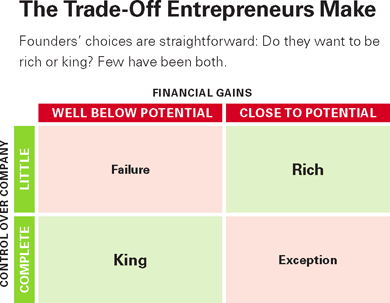If you started your own company, there’s a good chance you did so for two reasons: you wanted to build something of your own, and potentially make a lot of money doing so.
The problem? Most founders will have to settle for one of the two.
This is what Noam Wasserman has termed the Founder’s Dilemma.
The Founder’s Dilemma
Wasserman suggests that at a basic level, founder CEOs are choosing at every step between keeping control over their company, or loosening the reigns to grow the company beyond their own personal limits.
This problem becomes more pronounced as the company grows to a point where it becomes impossible for a CEO to have the last say in every matter. At this point, the company can grow faster if the CEO can get the right people on the bus and delegate more responsibilities to his team members.
Eventually, they’ll even have to consider if they’re the right person to fill the seat of CEO, or if the company would better off hiring a professional CEO. After all, the skills needed to grow a company from 0 to 10 people are different for 10 to 25, and different still for 25 to 100 and over.
This tension between success and control can be summarized in the following quadrant:

The main thing to take away from this figure is not that Rich is better than King, or the other way around – but simply that founders have to make a choice about which is more important to them. If they don’t, they risk having the choice made for them, as it is almost impossible to have both.
Why is it so hard to choose?
There are three main reasons that founding CEOs tend to hold on to control far longer than non-founding CEOs, sometimes beyond the point of no return.
Emotional attachment
Founders are often emotionally invested in their company, making it harder for them to let go and take a step back. They are used to having a central role in the company, and can often find it hard to accept “lesser” roles.
Superman complex
Founders are often convinced that they are the only one who can lead their company to success. They are overconfident about their odds of success, and tend to underestimate the risks and problems.
This is even more likely if they have experienced success in building a product or service in the early days of the business. Instead of realizing that selling and marketing a product at scale requires *completely* different skills from developing a product, this success can reinforce their conviction that they know, and can do, everything.
Fear of delegation
A founder has laid the foundation for many, if not all, of the company’s core processes. In doing so, they have often established a pattern where they might accept advice from others, but reserve the right to actually make decisions for themselves.
This works up to a point, but beyond that a founder will have to learn to delegate not just tasks, but the final responsibility as well. If they’re used to making all the decisions, this can be a very tricky transition.
Do you choose Rich or King?
So what do you do if you find yourself having to navigate the Founder’s Dilemma? If you find yourself having to choose between Rich or King, the best place to start is to be as honest as possible with yourself about why you started a company in the first place. Is it more important to build something you control, or is it more important to be a part of a successful company?
Truthfully answering this question will make it easer to accept the trade-offs between the two options, and can prevent needless friction between you and your company.
(Cover photo by Caleb Jones on Unsplash)
If you thought this was helpful, consider signing up for my newsletter. Every two weeks on Tuesday, you’ll get a new essay straight in your inbox!

